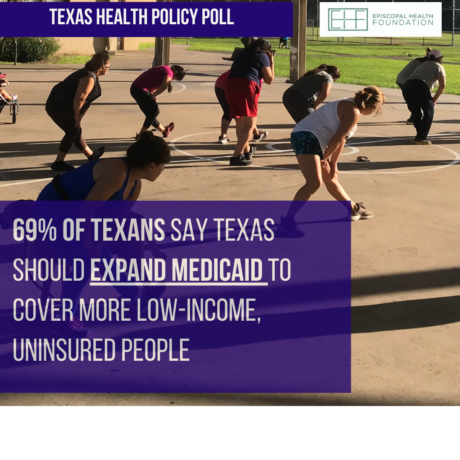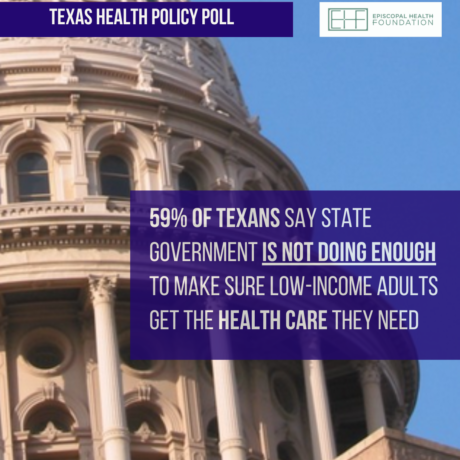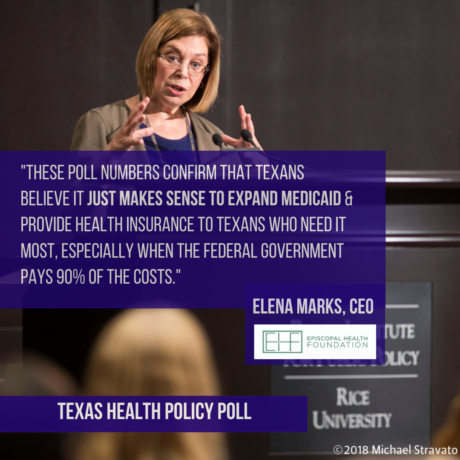
NEW Texas Health Policy Poll: Texans show sweeping support for expanding Medicaid
Majority of Texans say state legislature should play major role in making sure the health system works well & make health care spending a priority
Poll finds more than one third of adult Texans under age 65 don’t have health insurance; Most don’t know the state has the highest uninsured rate in the U.S.
A large majority of Texans support Medicaid expansion and say state government should play a role in making sure the health care system works well. Those are some of the results of a new statewide Episcopal Health Foundation survey on health policy issues in Texas.
The survey finds nearly seven in 10 Texans (69%) say they think the state should expand Medicaid to provide health insurance to more low-income Texans who are uninsured. That’s an increase from just a year earlier when Episcopal Health Foundation’s 2019 poll showed 64% of Texans supported Medicaid expansion. Researchers found large support for expansion despite the fact that the survey shows that less than half (43%) knew that Texas was one of only 12 states not to expand Medicaid under the Affordable Care Act.
Texans with low incomes (82%), those who say they are in fair/poor health (82%), and uninsured adults under age 65 (80%) were among the groups with the highest percentage supporting Medicaid expansion.
State government’s role in the health system
The poll also finds that an overwhelming majority of Texans think state government has a role to play in making sure the health care system works well. Almost nine in 10 (89%) say the state should play a major (66%) or minor (23%) role in a functioning health care system. At the same time, nearly six in 10 Texans (59%) say state government is not doing enough to make sure low-income adults get the health care they need.
When it comes to overall spending priorities for state government, more than half (57%) of Texans say the state should increase spending on health care – more than the percentage who say the same about public safety (50%) and infrastructure (49%). The survey finds that Texans only say they favor increased spending on public education (67%) more than health care.


Texas’ uninsured rate stays high
The survey confirms that Texas continues to have the highest uninsured rate in the country. The poll finds that 35% of adult Texans under age 65 say they don’t have health insurance. In addition, 7% of Texans said they lost health insurance at some point in 2020 due to the COVID-19 pandemic.
Despite the state’s sky-high uninsured rate, researchers found that a large majority (73%) of Texans didn’t know the state’s uninsured rate was higher than other states or incorrectly thought it was the same or lower.
Lowering costs and reducing maternal mortality are top health priorities for Texans
Majorities of Texans say top health priorities for the state legislature should be lowering costs of prescription drugs (63%), lowering health care costs (60%), reducing the number of women who die from causes related to pregnancy or childbirth (58%), increasing access to health insurance (57%), and increasing access to hospitals for people living in rural areas (54%).
These findings are part of a series of reports drawing on a 2020 Episcopal Health Foundation (EHF) survey of Texans on their views of health policy and experiences with health care costs. In 2018 and 2019, EHF published similar surveys and reports. Future reports in 2021 will look at the affordability of health care, access to medical care, and experiences of the uninsured in Texas.
Methodology
SSRS conducted the third wave of the Texas Health Policy Survey on behalf of Episcopal Health Foundation from November 30 through December 9, 2020. The goal of this survey was to understand the perspectives and experiences of Texas adults regarding their health care and health care policies in the state, with a comparison to similar studies completed in 2018 and 2019. For the 2020 Texas Health Policy Survey, SSRS interviewed a representative sample of 1,204 Texas adults (age 18 or older), reached via landline (n=296) and cell phone (n=908; including n= 747 who could not be reaching via landline) random digit dialing (RDD). Interviews were conducted by live professional telephone interviewers in English or Spanish based on the respondent’s language preference.
